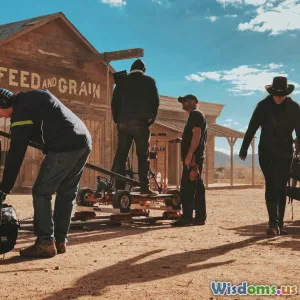
Navigating the World of Independent Film
7 min read Explore key strategies and insights to thrive in the vibrant, challenging world of independent film. (0 Reviews)
Navigating the World of Independent Film
Independent filmmaking is an exhilarating journey — a world fueled by passion, creativity, and resilience. Departing from Hollywood's blockbuster conventions, indie films often embrace unique storytelling, unconventional themes, and intimate perspectives that challenge cinematic norms. Yet, navigating this complex landscape requires more than just artistic vision. It demands strategic thinking, savvy resource management, and an understanding of both the craft and industry.
The Allure of Independent Film
Indie films offer freedom and risk unlike any other medium. Without the weight of bigger studio mandates, independent filmmakers can push boundaries creatively.
- Creative freedom: Many independent projects tell stories overlooked by mass-market cinema, shedding light on marginalized voices or experimental narratives. Films like Moonlight (2016), which won the Academy Award for Best Picture, exemplify indie success with deep cultural impact.
- Forging personal identity: Filmmakers like Richard Linklater (Boyhood) and Greta Gerwig (Lady Bird) built their careers on indie foundations, showcasing personal and authentic storytelling.
However, this freedom comes with hurdles—including limited budgets, distribution challenges, and the difficulty of reaching wide audiences.
Understanding the Challenges: A Reality Check
Funding Constraints
Financing remains the most significant hurdle for indie filmmakers. Unlike major studios, independent creators rarely have access to large financial pools.
- Crowdfunding platforms like Kickstarter and Indiegogo have democratized funding opportunities. For example, the 2014 film Veronica Mars raised over $5.7 million through Kickstarter, setting records for fan-driven financing.
- Grants and film funds from institutions, such as Sundance Institute and Tribeca Film Institute, support emerging filmmakers but are competitive and limited.
Distribution and Marketing
Beyond filming, distributing a movie demands attention and resources.
- Traditional theaters prioritize big-budget blockbusters, squeezing indie spaces.
- Streaming services like Netflix and Amazon Prime have transformed access, offering new avenues but intensifying competition.
- Film festivals remain critical for exposure; events like Sundance, Toronto International Film Festival, and South by Southwest have launched many indie careers.
Technical and Logistical Challenges
Independent filmmakers often juggle multiple roles—director, producer, editor, and marketer—leading to resource strain. Mastering various technical skills or building a versatile team is essential.
Practical Strategies for Success
Building a Strong Narrative Foundation
The story is the core asset.
- Focus on authentic, character-driven tales that resonate emotionally. Films like Lady Bird captivate through relatable, nuanced storytelling.
- Workshops and script feedback forums (e.g., The Black List or Cinematically Speaking) help refine scripts before shooting.
Leveraging Technology and Innovation
- Affordable digital cameras (Canon EOS series, Sony A7SIII) and editing software (DaVinci Resolve, Adobe Premiere Pro) have lowered entry barriers.
- Virtual production tools and crowdfunding platforms enable resourceful lean productions.
Networking and Collaboration
- Film communities on platforms like Meetup, Stage 32, and FilmFreeway offer networking opportunities.
- Collaboration with local artists, writers, and musicians can enhance aesthetics and lower costs.
Festival Strategy
- Early targeting of festivals suited to the movie’s genre or theme increases selection odds.
- Developing festival partnerships and knowledge of festival circuits can enhance exposure.
Marketing and Audience Engagement
- Social media platforms like Instagram, TikTok, and Twitter allow filmmakers to cultivate audiences pre-release.
- DIY trailers, behind-the-scenes content, and blogs help create buzz.
- Engaging niche audiences with personalized outreach often yields better results than mass marketing.
Case Study: The Rise of The Blair Witch Project
An iconic example of indie success is The Blair Witch Project (1999). With an estimated budget of $60,000, filmmakers Daniel Myrick and Eduardo Sánchez employed resourceful guerrilla filmmaking techniques:
- Using handheld cameras and DIY special effects simulated authenticity and horror.
- Innovative viral marketing—via early internet promotion—created buzz prior to wide release.
The film grossed nearly $250 million worldwide, proving how ingenuity and strategic marketing can disrupt the industry.
Essential Resources for Independent Filmmakers
- Sundance Institute: Provides grants, labs, and support for projects focused on enriching independent voices.
- Film Independent: Offers panels, workshops, and the Spirit Awards celebrating indie work.
- No Film School: A community and resource hub offering tutorials, gear reviews, and artistic insights.
Conclusion: Embracing the Journey
Independent filmmaking is not just about creating movies; it’s about storytelling with honesty, craft, and courage against industry odds. Success relies on passion blended intelligently with strategic planning—from funding and production to marketing and distribution. Cinephiles and creators willing to embrace the challenge will find indie filmmaking an immensely rewarding path.
The world of independent film brims with potential — stories waiting to be told, perspectives waiting to be heard. As Kenneth Branagh once said, "Every great film should seem new every time you see it." In indies, fresh vision is the lifeblood, and navigating its world unlocks that vibrancy for audiences everywhere.
Ready to tell your story? Start small, think big, and navigate smart—because the world of independent film is uniquely yours to explore.
Rate the Post
User Reviews
Popular Posts




















